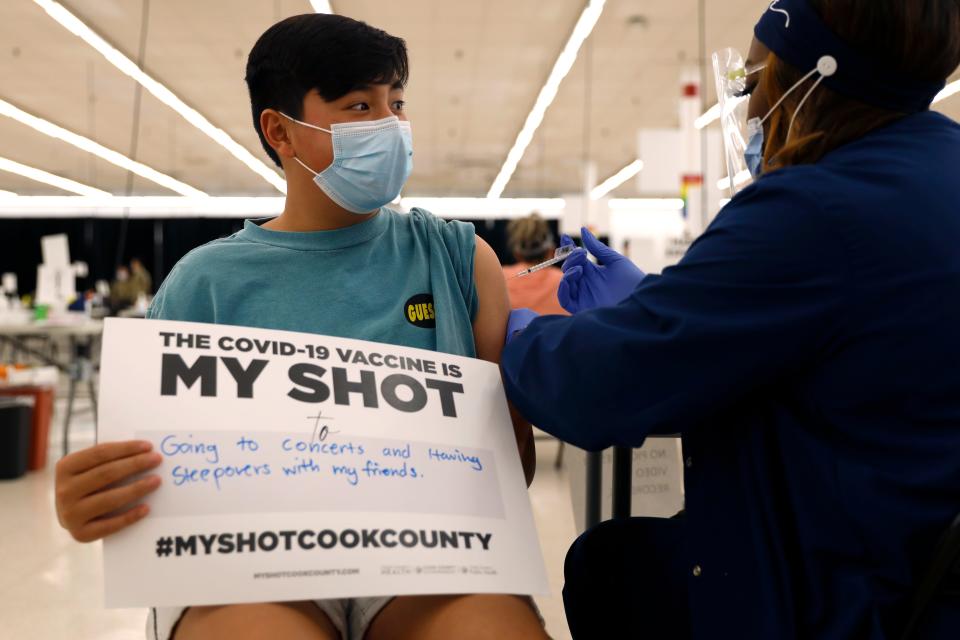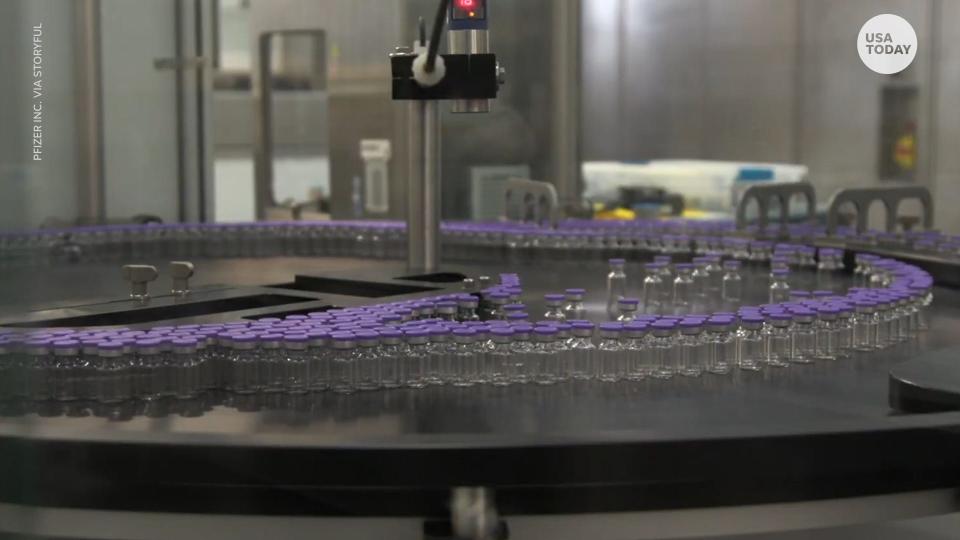Pfizer's vaccine is FDA-approved for adults, but it's still a 'no-no' to vaccinate kids under 12
Leading pediatricians said loudly and in unison Monday that doctors should not prescribe COVID-19 vaccines to children under 12.
With the Food and Drug Administration's full approval of Pfizer-BioNTech's COVID-19 vaccine, such "off-label" use is now legal. But it's definitely not a good idea, a number of experts said.
"We don't have the data on young children. So that really ought to be a no-no," said Dr. Jesse Goodman, an infectious disease expert at Georgetown University. "The science is not there to support dosing yet in small children."
Children under 12 have not yet been approved to receive any COVID-19 vaccine, for the simple reason that it has not yet been proven safe and effective for them. Plus, while everyone 12 and up is given the same dose, a child of 5 years probably would need a smaller amount of vaccine than someone age 55, Goodman and others said.
Studies in children 5 to 11 are likely to be finished early this fall, Pfizer and its German partner BioNTech have said, with trials in younger children probably not ready until the end of the year or early next year.
“We need to see the data from those studies before we give this vaccine to younger children,” Dr. Lee Savio Beers, president of the American Academy of Pediatrics, said in a prepared statement. “The AAP recommends against giving the vaccine to children under 12 until authorized by the FDA.”

The pediatricians association "strongly recommends" that adolescents 12 and up, who are already eligible for the vaccine, be vaccinated as soon as possible. "The data from clinical trials and experience with the vaccine over the past four months in these adolescents show that it is safe and very effective in this age group," Beers said.
Instead of vaccinations, children younger than 12 should wear masks while in school and in public settings, as well as avoid crowds and wash hands regularly, public health officials have said.
It's not easy to pronounce: But one thing is certain about FDA-approved Comirnaty: It works
"While we wait for vaccines, we have measures that are effective," Dr. Bob Frenck, lead researcher for Pfizer’s vaccine studies and director of Vaccine Research Center at Cincinnati Children’s Hospital Medical Center, said via email. "Masks can decrease risk of infection by about 85%, and appropriate distancing can decrease the risk by about 82%."
Giving the adult dose could lead to unnecessary side effects.
"While the side effects are short-term and relatively mild, if you can avoid, or lessen, side effects and still get the same immune response, that is the course to take," Frenck said.

Several vaccines, including Pfizer-BioNTech's, have been shown to increase the risk of myocarditis, a swelling of the heart muscle. Although rare – affecting just 1 out of every 20,000 vaccinated people – and most cases have resolved quickly, the side effect was more common among younger men and adolescents. It's not yet clear whether younger children also could develop the inflammation.
"We certainly saw a number of kids in our hospital with (myocarditis)," Dr. Paul Offit, a pediatric infectious disease expert at the Children's Hospital of Philadelphia, said in a briefing Monday.
"I'm a fan of vaccines," said Offit who helped develop a vaccine against rotavirus, which causes diarrheal disease in infants and children, and runs his hospital's Vaccine Education Center. "I would be loath to vaccinate my 9- or 10-year-old until I saw the data."
Doctors should not be in the business of trying to guess what lower dose would be safe and effective in a child, Dr. Yvonne Maldonado, chair of the AAP's Committee on Infectious Diseases, said in a statement.
“We do not want individual physicians to be calculating doses and dosing schedules one-by-one for younger children based on the experience with the vaccine in older patients,” Maldonado said in a statement. “We should do this based on all of the evidence for each age group, and for that we need the trials to be completed."
The AAP has called on the FDA to accelerate the process of authorizing shots for children under 12 by relying on early trial data rather than waiting for more complete results.
In the week ending Aug. 19, about 180,000 children and adolescents were infected with the coronavirus, virtually all with the delta variant, the AAP said Monday. Since the beginning of the pandemic, nearly 4.6 million minors have been infected – almost 15% of total cases – and rates have increased fourfold in just the past month, reaching roughly the same levels as last winter's surge. Hospitalization and death rates remain low among children.
“We know parents are eager to be able to give their children the protection of this vaccine, and the American Academy of Pediatrics shares that feeling of urgency,” Beers said. "While we wait for a vaccine to be authorized for younger children, it’s important that everyone who is eligible now get the vaccine. That will help reduce the spread of the virus and protect those who are too young to be vaccinated.”
Contact Karen Weintraub at kweintraub@usatoday.com.
Health and patient safety coverage at USA TODAY is made possible in part by a grant from the Masimo Foundation for Ethics, Innovation and Competition in Healthcare. The Masimo Foundation does not provide editorial input.
This article originally appeared on USA TODAY: COVID vaccines still a 'no-no' for young children, pediatricians say

 money
money 